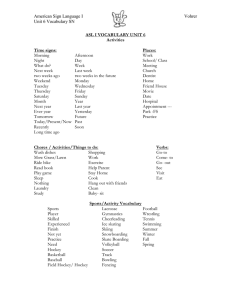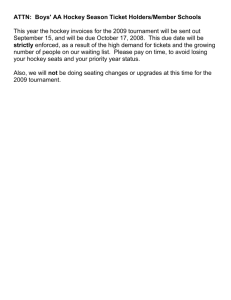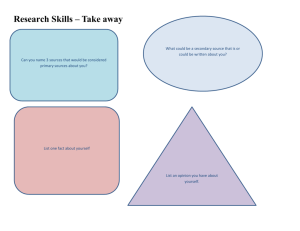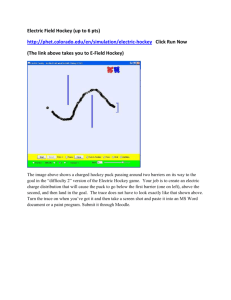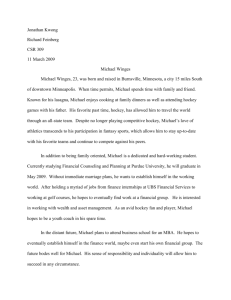na na na na, hey hey hey, goodbye
advertisement
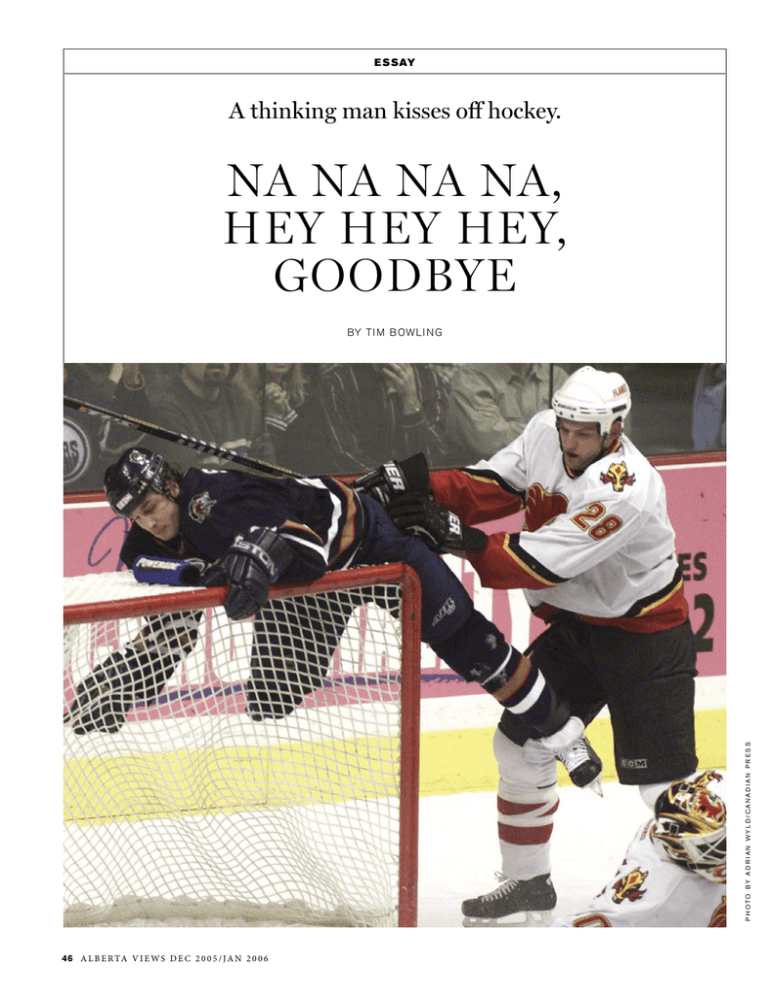
E S SAY A thinking man kisses off hockey. na na na na, hey hey hey, goodbye P H OTO BY A D R I A N W Y L D / C A N A D I A N P R E S S by T i m B ow li n g 46 a l b e r ta v i e w s D E C 2 0 0 5 / J A N 2 0 0 6 “I don’t want to think—I want to be entertained.” -Dave Nonis, General Manager, Vancouver Canucks Vancouver Province, October 2005 I IT’S LATE SPRING, 1993. Millions of Canadians are tuned in to Game 7 of the Stanley Cup semifinals between the Toronto Maple Leafs and the Los Angeles Kings. It’s an event of operatic drama. The Leafs have not won the Stanley Cup since 1967, while the Kings, in uncharted territory, are led by none other than the Great One, Wayne Gretzky, whose 1988 trade from Edmonton to Hollywood shocked those same millions of Canadians now frozen before their TV sets. I’m not one of those millions. It is true I have been a hockey fan as long as I can remember. In fact, one of my earliest memories is from the late sixties, not long after the Leafs’ last Cup raising, when I’d play with hockey cards on the linoleum floor of the kitchen, passing a marble back and forth and reenacting great goals and saves as my mother clattered dishes in the sink nearby. The NHL has always been my primary source of spectator entertainment. But I’m not watching Game 7 between the Leafs and the Kings. I can’t. The tension is too much for me. I care too much. I so loathe the Kings—representatives of everything glitzy, shallow, crass and American—and so want an all-Canadian dream final between the Leafs and Montreal Canadiens, that I’m hiding out from the game. This is not an easy thing to do when nearly the whole country is tuned in. I’m so well versed in watching televised hockey that even the faintest sound emanating from a TV set or someone watching a TV set will tip me off to developments in the game. So I have to get away. But to where? Fortunately, I’m old enough and smart enough to be resourceful. While Gretzky dipsy-doodles behind the Leafs’ net, I sit in a dark, nearly empty Vancouver theatre, watching Howard’s End. It’s a long movie, long enough to cover three periods and at least one period of overtime. With luck, the drama, NHL style, will be over before the credits roll. As humiliating as it is to recall this memory, I mention it for two reasons. One, it highlights the bizarre Canadian fact that many so-called sensitive, cultured men (the sort who happily watch Ivory/Merchant films) are nonetheless fervent fans of a brutal, bone-breaking, blood-spattering sport. And two, it marks my nadir as a professional hockey fan. In the spring of 1993, something had to give. Either I was going to remain a “fanatic,” or I was going to put away childish things. For God’s sake, I had even read several E.M. Forster novels! What the hell was I doing caring so much about professional hockey, a game so violent that its rules include penalties for drawing blood and instigating fights? I abhorred violence and even cited it as a reason why I so disliked the United States. Yet I was drawn to the NHL like a bear to a campsite, like a politician to graft, like Simone de Beauvoir to Jean-Paul Sartre. I just couldn’t turn away. Only when I walked out of that theatre into the street and hailed a group of teenaged boys (obviously they’d know the result of the game), and saw them shrug and heard one say “I have no idea,” did I begin the process of cultural deprogramming that would find me, a decade later, completely indifferent to the labour dispute between the NHL team owners and players. However, indifference to the business side of professional hockey, and to the NHL, whose games have so declined in quality over the past decade that a breakaway merits a mention on the national news, doesn’t quite translate into disinterest. The truth is, like so many non-violent Canadian men, alternately bored and disgusted by the game’s outdated machismo code, I always have one ear cocked for news of the NHL. This remains true despite the fact that I no longer watch the games or care who wins, and that I actively scorn the corporate and boorishly patriotic culture that has grown up around professional hockey in Canada. Why? What is it about the NHL that retains even a slight grip on my imagination? The most compelling answer concerns the primal pull of narrative. The NHL, for better or worse, is the Great Canadian Novel, a tale replete with villains and heroes, prima donnas and blue collar types, triumph and failure, hope and revenge, all played out at high speed over generations. Like millions of Canadians, I grew up on the lore of the game, everything from Conn Smythe’s infamous remark that “if you can’t beat ’em in the alley, you can’t beat ’em on the ice” to Paul Henderson’s famous series-winning goal against the Soviets in 1972. When the Tragically Hip uncovered a great rock song in the tragic death of the Leafs’ Bill Barilko—“Bill Barilko disappeared/that summer (in 1951)/he was on a fishing trip (in a plane)/The last goal he ever scored (in overtime)/won the Leafs the Cup/They didn’t win another until 1962/the year he was discovered”—I understood. When the internationally acclaimed Canadian filmmaker Atom Egoyan directed a TV movie about Brian “Spinner” Spencer’s descent from NHL tough guy to drug gang shooting victim, I understood. When ex-Maple Leafs defenceman Tim Horton’s doughnut chain became a Canadian cultural icon, I understood. The NHL, in short, is the book most Canadians have been reading all their lives. What other is there? Just as King Shahryar put off killing Scheherazade because he wanted to hear how the story she was telling would turn out, I can’t quite kill off my interest in the NHL. Northrop Frye maintained that narrative was the common denominator between high and low culture, which explains our interest in everything from opera to soap opera. That makes eminent sense to this disillusioned NHL follower—why else should I carry around ridiculous facts such as six out of seven Sutter brothers from Viking, Alberta, made the big time and Bobby Clarke overcame diabetes to realize his professional dreams, or smile with goofy fondness at the common graffiti of my childhood—“Jesus Saves, Esposito Scores on the Rebound”? Canadian poet Al Purdy described hockey as a combination of ballet and murder. Certainly the grace and beauty of the game when played well remains a major reason why I’m still mildly attracted to the NHL. After all, the players are the most skilled in the world, even if expansion and relentless marketing (just a l b e r ta v i e w s D E C 2 0 0 5 / J A N 2 0 0 6 47 Explaining the tension of the 1972 Canada VS. USSR Summit Series, how many jerseys can one team have?) have conspired to water down the talent and glaciate the pace of play. Besides, hockey requires a special skill that takes years to master. Most people can imagine doing the running and jumping and catching required by baseball, football and basketball, but if you can’t skate (and many Canadians can’t), you can’t even take to the playing surface. Hockey is uniquely demanding at its most basic level, and therefore its beauty is all the more impressive. Even so, would a ballet lover, in expectation of a rare graceful step, put up with the prima ballerina being slammed into the scenery every few minutes? This question leads directly to the most worrying explanation for my ongoing interest in the NHL: I’m not nearly as sensitive and enlightened as I think I am. When Thomas Hobbes wrote that life is “nasty, brutish and short,” he wasn’t referring to hockey, but, like most Canadian men, I’ve absorbed a Hobbesian philosophy as a way to justify my imaginative commitment to a machismo culture in which 14year-old boys are sent away from home to play junior hockey and, as in the case of Sheldon Kennedy and others, sexually abused by their coaches in the process; and in which a star player like Todd Bertuzzi can jump an opponent from behind, breaking his neck, and not be universally vilified for his actions, but rather become the particular hero of Vancouver Don Cherry, outspoken host of Coach’s Corner, exemplifies the strong link between hockey and nationhood by using his sports show to lobby for increased support of the armed forces. 48 a l b e r ta v i e w s D E C 2 0 0 5 / J A N 2 0 0 6 Canucks hockey fans. In fact, Don Cherry, the wildly popular spokesman for everything bigoted and “traditional” in hockey culture, is a sort of combination Thomas Hobbes/Don Rickles/ Buffalo Bill Cody, exploiting a dog-eat-dog philosophy to garner laughs at others’ expense while travelling around the country in his garish huckster’s clothes. Perhaps following the NHL, and watching Coach’s Corner, is simply akin to slowing down on the highway to gawk at an accident. We don’t like what we see, but we’re drawn to it in some primal way. But that’s too harsh an indictment of our fascination with the NHL. A more likely reason for it is political. It’s perhaps a cliché by now to point out the importance of hockey to Canada’s national identity, but it’s a cliché with undeniable truth. When the Canadian icemakers at the 2002 Winter Olympic games in Salt Lake City placed a loonie under the ice as good luck for Team Canada in its gold medal game with Team USA, most Canadians were delighted. And a major part of that delight lies in our undefeatable conviction that, no matter what else the world beats us at, it can’t beat us at hockey. This particular form of patriotism has deep roots for my generation of hockey fans, of course. Explaining the tension of the 1972 Summit Series between Canada and the USSR, in which Team Canada won the final three games behind the Iron Curtain to retain global hockey supremacy, Phil Esposito, with no sense of embarrassment or irony, remarked, “It wasn’t hockey, it was war.” Well, Phil, I was happy Canada won, and at one time I even understood Bobby Clarke’s vicious slash of Valeri Kharlamov, which knocked the Soviets’ star player out of the series, as a patriotic act. But the summit series was not Vimy Ridge or Dieppe. Yet the link between hockey and nationhood, as currently promoted even more vociferously by media coverage of the game in Canada, is not easily broken. That Don Cherry can use his few minutes of nationally televised screen-time every week to lobby for increased support of Canada’s armed forces proves just how powerfully the hockey/nationhood link is forged (and don’t forget Jean Chrétien dubbed his globetrotting trade missions Team Canada, in a desperate attempt to benefit from reflected hockey glory). One day, perhaps, our soldiers will wear their names on their backs and UN peacekeeping missions will end with the announcement of first, second and third stars. A more honourable connection between the NHL and Canadian political life does exist, however. Because professional hockey is a shared national story, it affords us a kind of grassroots democracy. Everyone is entitled to participate in the tangled discourse of finance, politics and entertainment spawned by the modern NHL. Your background doesn’t matter (unless you’re an American), your education and income don’t matter, not even your annual P H O T O B Y R O B E R T TA Y L O R / C A N A D I A N P R E S S in which Team Canada won behind the Iron Curtain, Phil Esposito, with no sense of irony, remarked, “it wasn’t hockey, it was war.” beer consumption matters. If you have an opinion on salary caps or on refereeing or on the superiority of Edmonton over Calgary as a hockey city, you’re welcome to share it. Whether you’re in Glace Bay or Nanaimo, Guelph or Banff (or any other place that sounds like two players colliding), you can walk into a bar where Hockey Night in Canada is showing and feel that your opinions are a national birthright, like 5 per cent beer and bilingualism (OK, maybe not bilingualism, but you get the idea). At this point, no doubt, many Canadians will throw up their hands in frustration and say, “He’s taking all this too seriously. It’s just a game.” Well, let’s look at the NHL from the simple perspective of escapist entertainment. Into what are we escaping exactly? When I was a boy, the boards, ice and score clock were free of advertising; goals and assists meant more than salaries; and players and teams had distinct characters. If you attended a game, there was silence after the whistle so you could hear someone in the crowd heckle a ref (one I remember from the seventies, directed at referee, Bruce Hood: “Hey, Bruce, take off your hood!” Not exactly Evelyn Waugh level of wit, but appreciated nonetheless). Or perhaps, instead of silence, an organist played “Three Blind Mice.” Today at a game, you’re so relentlessly bombarded with supersonic noise and flashing lights and company logos that you come away with two conclusions: the NHL is for 20-year-old men who love violent video games, and the games themselves are beside the point, just another way to promote a crass, materialistic, corporatist agenda. We’re deep into the NHL season now, the first in two years. Dozens of players have changed teams, a dozen others have retired. There’s a new phenom named Sidney Crosby who’s expected to challenge the scoring statistics of Gretzky one day, and the Leafs still haven’t won the Cup since 1967 (the Kings beat them back in ’93, in case you were dying to know). I haven’t watched a game all year, and I don’t intend to, just as I didn’t miss the NHL at all during its year-long absence— which was, in fact, wonderfully refreshing, like fasting after binging on double-doubles and maple creams down at the local Tim Hortons. Why should I follow a sport whose foundation in this country is made of blood and beer and an empty rhetoric around outdated and destructive notions of patriotism and manhood? I shouldn’t, and neither should you, especially if you’re over 40. To everything there is a season, as the Bible says, and the season for the NHL is past. As the league continues to struggle with its dinosaur code of machismo, as it expands into Arkansas and Tijuana, as the players wear jerseys with WalMart and McDonalds logos, I won’t be watching. And yet, if somehow the fates conspire, and two Canadian teams meet in the Stanley Cup Finals, can I resist the lure of nostalgia and the pull of narrative? Can I stop thinking and be entertained? Tim Bowling is a poet. His most recent collection is The Memory Orchard. He lives in Edmonton. a l b e r ta v i e w s D E C 2 0 0 5 / J A N 2 0 0 6 49
